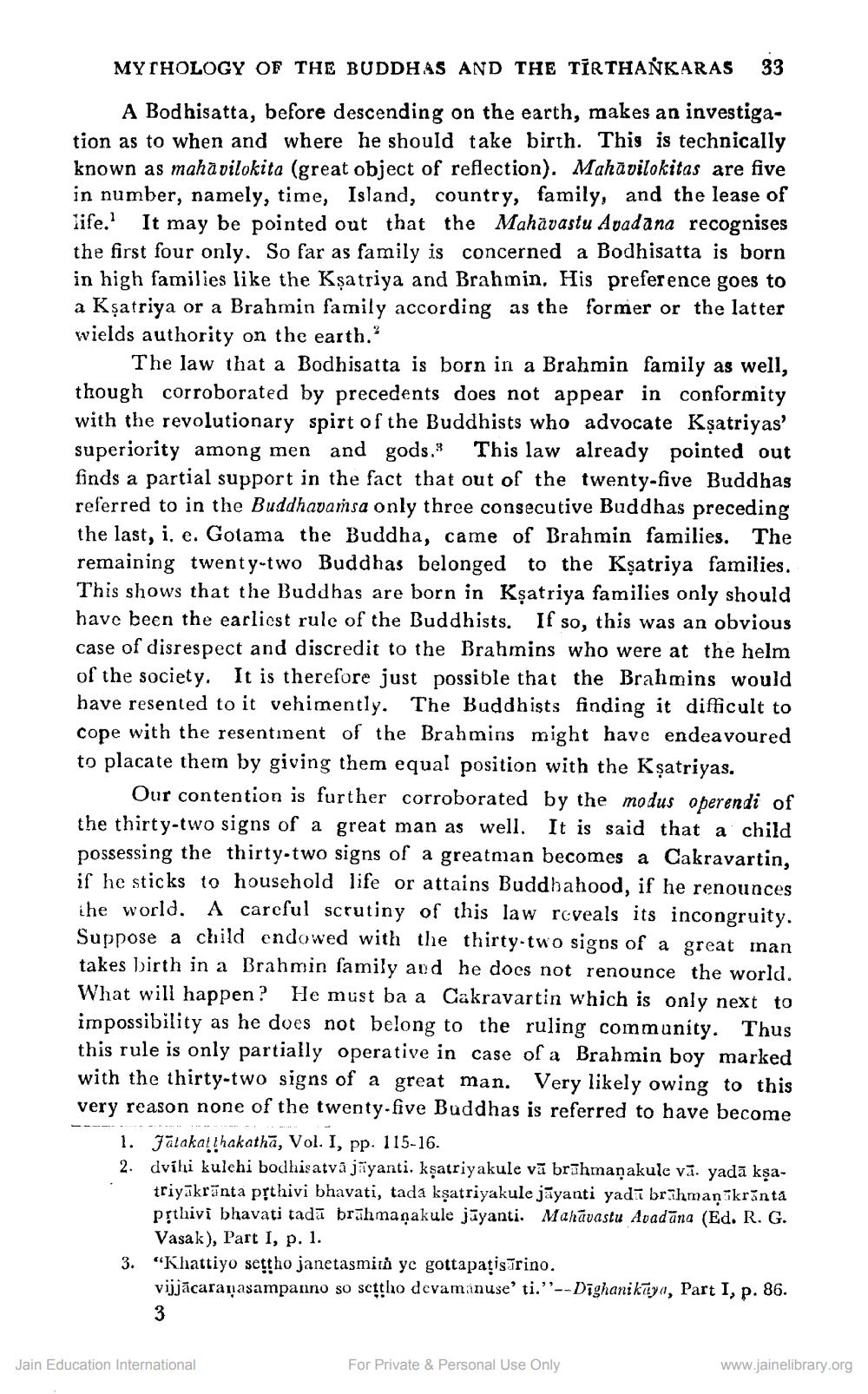________________
MYTHOLOGY OF THE BUDDHAS AND THE TIRTHANKARAS
A Bodhisatta, before descending on the earth, makes an investigation as to when and where he should take birth. This is technically known as maha vilokita (great object of reflection). Mahāvilokitas are five in number, namely, time, Island, country, family, and the lease of life.1 It may be pointed out that the Mahavastu Avadana recognises the first four only. So far as family is concerned a Bodhisatta is born in high families like the Ksatriya and Brahmin. His preference goes to a Ksatriya or a Brahmin family according as the former or the latter wields authority on the earth."
The law that a Bodhisatta is born in a Brahmin family as well, though corroborated by precedents does not appear in conformity with the revolutionary spirt of the Buddhists who advocate Ksatriyas' superiority among men and gods." This law already pointed out finds a partial support in the fact that out of the twenty-five Buddhas referred to in the Buddhavamsa only three consecutive Buddhas preceding the last, i. e. Gotama the Buddha, came of Brahmin families. The remaining twenty-two Buddhas belonged to the Ksatriya families. This shows that the Buddhas are born in Ksatriya families only should have been the earliest rule of the Buddhists. If so, this was an obvious case of disrespect and discredit to the Brahmins who were at the helm of the society. It is therefore just possible that the Brahmins would have resented to it vehimently. The Buddhists finding it difficult to cope with the resentment of the Brahmins might have endeavoured to placate them by giving them equal position with the Ksatriyas.
Our contention is further corroborated by the modus operendi of the thirty-two signs of a great man as well. It is said that a child possessing the thirty-two signs of a greatman becomes a Cakravartin, if he sticks to household life or attains Buddhahood, if he renounces the world. A careful scrutiny of this law reveals its incongruity. Suppose a child endowed with the thirty-two signs of a great man takes birth in a Brahmin family and he does not renounce the world. What will happen? He must ba a Cakravartin which is only next to impossibility as he does not belong to the ruling community. Thus this rule is only partially operative in case of a Brahmin boy marked with the thirty-two signs of a great man. Very likely owing to this very reason none of the twenty-five Buddhas is referred to have become
1. Jatakatthakatha, Vol. I, pp. 115-16.
2. dvihi kulehi bodhisatva jayanti. kṣatriyakule va brāhmaṇakule va. yada kṣatriyäkränta pṛthivi bhavati, tada kṣatriyakule jayanti yadi brāhmaṇikrinta pṛthivi bhavati tadā brāhmaṇakule jayanti. Mahavastu Avadana (Ed. R. G. Vasak), Part I, p. 1.
33
3. "Khattiyo settho janetasmith ye gottapatisarino.
vijjācaraṇasampanno so setṭho devamanuse' ti."--Dighanikaya, Part I, p. 86.
3
Jain Education International
For Private & Personal Use Only
www.jainelibrary.org




